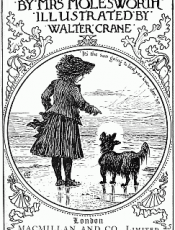sandy bright was coming down the road from spinner's carrying a side of bacon he had taken in exchange for a clock. he saw nothing of the light but he heard and saw the strange bird. he suddenly heard a flapping and a voice like a woman wailing, and being a nervous man and all alone, he was alarmed forthwith, and turning (all a-tremble) saw something large and black against the dim darkness of the cedars up the hill. it seemed to be coming right down upon him, and incontinently he dropped his bacon and set off running, only to fall headlong.
he tried in vain—such was his state of mind—to remember the beginning of the lord's prayer. the strange bird flapped over him, something larger than himself, with a vast[pg 5] spread of wings, and, as he thought, black. he screamed and gave himself up for lost. then it went past him, sailing down the hill, and, soaring over the vicarage, vanished into the hazy valley towards sidderford.
and sandy bright lay upon his stomach there, for ever so long, staring into the darkness after the strange bird. at last he got upon his knees and began to thank heaven for his merciful deliverance, with his eyes downhill. he went on down into the village, talking aloud and confessing his sins as he went, lest the strange bird should come back. all who heard him thought him drunk. but from that night he was a changed man, and had done with drunkenness and defrauding the revenue by selling silver ornaments without a licence. and the side of bacon lay upon the hillside until the tallyman from portburdock found it in the morning.
the next who saw the strange bird was a solicitor's clerk at iping hanger, who was climbing the hill before breakfast, to see the sunrise. save for a few dissolving wisps of cloud the sky had[pg 6] been blown clear in the night. at first he thought it was an eagle he saw. it was near the zenith, and incredibly remote, a mere bright speck above the pink cirri, and it seemed as if it fluttered and beat itself against the sky, as an imprisoned swallow might do against a window pane. then down it came into the shadow of the earth, sweeping in a great curve towards portburdock and round over the hanger, and so vanishing behind the woods of siddermorton park. it seemed larger than a man. just before it was hidden, the light of the rising sun smote over the edge of the downs and touched its wings, and they flashed with the brightness of flames and the colour of precious stones, and so passed, leaving the witness agape.
a ploughman going to his work, along under the stone wall of siddermorton park, saw the strange bird flash over him for a moment and vanish among the hazy interstices of the beech trees. but he saw little of the colour of the wings, witnessing only that its legs, which were long, seemed pink and bare like naked flesh, and its body mottled white. it[pg 7] smote like an arrow through the air and was gone.
these were the first three eye-witnesses of the strange bird.
now in these days one does not cower before the devil and one's own sinfulness, or see strange iridiscent wings in the light of dawn, and say nothing of it afterwards. the young solicitor's clerk told his mother and sisters at breakfast, and, afterwards, on his way to the office at portburdock, spoke of it to the blacksmith of hammerpond, and spent the morning with his fellow clerks marvelling instead of copying deeds. and sandy bright went to talk the matter over with mr jekyll, the "primitive" minister, and the ploughman told old hugh and afterwards the vicar of siddermorton.
"they are not an imaginative race about here," said the vicar of siddermorton, "i wonder how much of that was true. barring that he thinks the wings were brown it sounds uncommonly like a flamingo."
